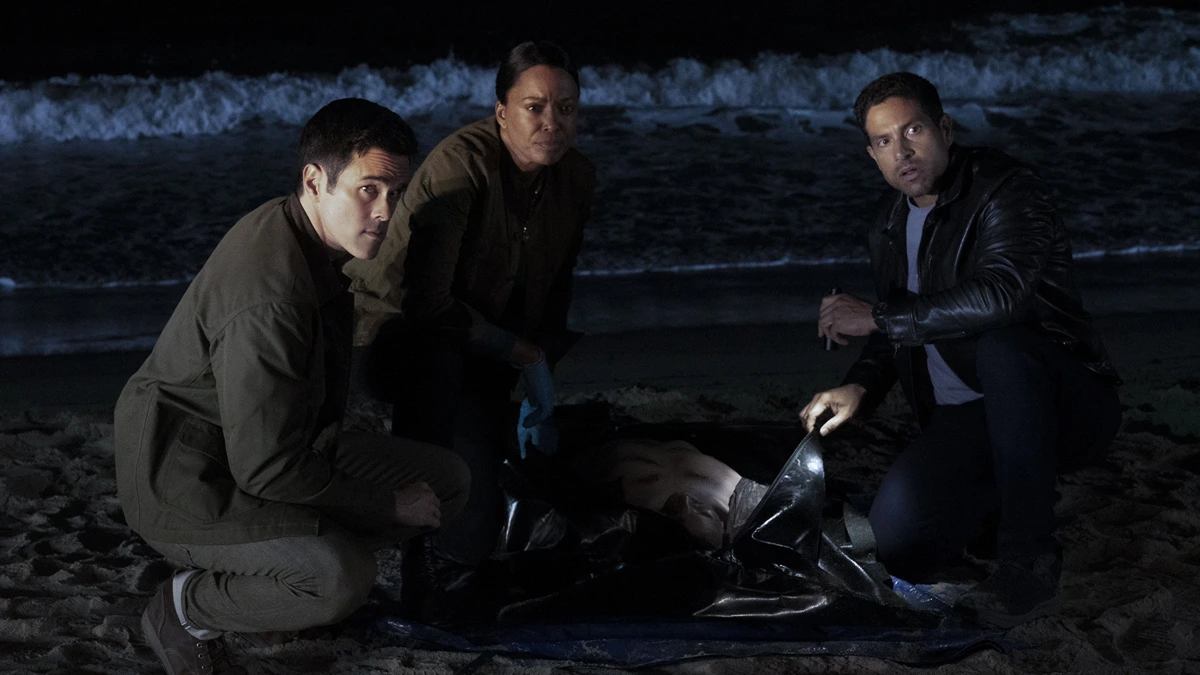The much-anticipated premiere of Criminal Minds: Evolution Season 18, titled “Swimmer’s Calculus,” aired on Paramount+ on May 8, 2025, marking the return of the Behavioral Analysis Unit (BAU) to tackle yet another chilling case while grappling with the lingering shadow of serial killer Elias Voit. As the third season of the Evolution reboot (or the 18th season overall, depending on how you count), this episode sets the stage for what promises to be a complex, emotionally charged journey. While the premiere delivers the procedural thrills fans expect, it also raises questions about the show’s direction, blending classic Criminal Minds elements with the darker, serialized tone of the reboot. Here’s a deep dive into the episode’s highs, lows, and what it means for the season ahead.
The episode opens with a grim discovery: bodies washing up on the Maryland shoreline, each bearing a peculiar signature that hints at a meticulous and sadistic unsub. The BAU—led by seasoned profilers David Rossi (Joe Mantegna) and Emily Prentiss (Paget Brewster)—quickly jumps into action, piecing together the clues with their trademark expertise. Trainee Tyler Green (Ryan-James Hatanaka), now more integrated into the team, uncovers a critical detail: the victims didn’t drown in the ocean but in a pool, as evidenced by “swimmer’s calculus,” a brown residue on their teeth caused by chlorine exposure. This revelation shifts the investigation, revealing the unsub’s method—drowning victims in a controlled environment before dumping their bodies at sea to mask the true crime scene.
The unsub, later identified as Franklin Fowler, is a textbook Criminal Minds villain, his psyche rooted in a traumatic childhood event. At age 10, Fowler witnessed his family drown under a pool tarp, an incident that warped his understanding of fear and survival. Now, he forces his victims to tread water in his backyard pool until exhaustion claims them, watching their struggle with a chilling detachment. The episode’s most harrowing sequence involves a mother and daughter, forced into the pool after the unsub executes the father for refusing to comply. The psychological torture—making victims fight for their lives while he observes—adds a layer of horror that the show has always excelled at portraying. It’s a stark reminder of why Criminal Minds remains a standout in the crime drama genre: its unflinching look into the minds of those who commit the unthinkable.

While the case itself is gripping, it feels somewhat formulaic, echoing the standalone “catch the bad guy” episodes of the show’s earlier seasons. Posts on X reflect a mixed sentiment, with some fans appreciating the return to “old school profiling skills” but others finding the case “boring and repetitive.” The unsub’s backstory, while tragic, lacks the depth or uniqueness to truly stand out against the show’s long history of twisted killers. Fowler’s final act—delivering a cryptic farewell message to the team before taking his own life—hints at a possible connection to a larger network, but the episode doesn’t linger long enough to explore this thread, leaving it as a dangling promise for future episodes.
What sets “Swimmer’s Calculus” apart from a typical Criminal Minds case is the ongoing saga of Elias Voit (Zach Gilford), the notorious “Sicarius Killer” who has haunted the BAU since the reboot began. The episode picks up six months after Voit was brutally attacked by fellow inmates, an event that left him in a medically induced coma. This time jump allows the show to explore the fallout: Rossi is under investigation by the Office of Professional Responsibility (OPR) for his potential involvement in the attack, a subplot that adds tension to his dynamic with Prentiss. Their scenes together are a highlight, showcasing the chemistry between Mantegna and Brewster as two colleagues who understand each other on a profound level. A particularly poignant moment comes when Rossi discovers Voit had a hidden shank during the attack, a revelation that deepens the mystery of his survival.
Meanwhile, Penelope Garcia (Kirsten Vangsness) takes on an unexpected role as Voit’s bedside companion, a decision that has sparked debate among fans. Garcia, ever the empath, insists she sees “a soul” in Voit, a belief that Luke Alvez (Adam Rodriguez) struggles to understand but respects. This development feels jarring—Garcia’s compassion has always been a cornerstone of her character, but her willingness to sit by a serial killer’s side stretches believability. The episode’s final moments, however, deliver a gut punch: Voit awakens from his coma and immediately strangles a nurse, his unrestrained arm a glaring oversight that underscores his dangerous unpredictability. The scene, devoid of alarms or monitors, is a chilling reminder that Voit remains a formidable threat, even from a hospital bed.
The BAU’s dynamics are further enriched by the team’s interactions on the case. JJ (A.J. Cook) and Tara (Aisha Tyler) team up with Luke and Tyler, forming pairs that bring a fresh energy to the investigation. Tyler, in particular, shows growth, his analysis of the “swimmer’s calculus” proving pivotal to cracking the case. His evolution from a peripheral character to a more confident member of the team is a welcome development, though some fans on X noted that his integration still feels like a work in progress. Garcia, as always, provides a burst of warmth and humor, her infectious personality a counterbalance to the episode’s darker moments.
Visually, “Swimmer’s Calculus” struggles at times. The opening scenes are so dimly lit that they border on parody, a criticism echoed by reviewers who have begged Paramount+ to “invest in a flashlight or two.” While the darkness adds to the episode’s ominous tone, it occasionally obscures key details, making it hard to fully engage with the action. Once the investigation moves to brighter settings, the cinematography improves, capturing the tension of the pool drownings with a claustrophobic intensity that mirrors the victims’ desperation.
The episode also sets up several threads for the season ahead. Fowler’s farewell message to Tara, JJ, Luke, and Tyler hints at a potential connection to Voit’s network of serial killers, a plotline that has been central to Evolution since its inception. Prentiss notes that Fowler’s technology overlaps with the tools Voit used to build his network, suggesting that the BAU may be facing a larger, more orchestrated threat. This serialized element is where Evolution diverges from the original series, leaning into season-long arcs that add depth but sometimes overshadow the standalone cases. As one reviewer noted, the show’s challenge this season will be striking a balance between these overarching conspiracies and the weekly unsubs that have always been its bread and butter.
Looking ahead, Season 18 promises to be a pivotal one for Criminal Minds: Evolution. The return of fan-favorite Dr. Spencer Reid (Matthew Gray Gubler) in a later episode has already heightened expectations, though his absence in the premiere underscores the void left by his character. New cast member Aimee Garcia, who joins as Dr. Julia Ochoa, a neuropsychiatrist tasked with treating a high-profile patient (likely Voit), is expected to bring a fresh perspective, though she doesn’t appear in this episode. Showrunner Erica Messer has hinted that the season will blend standalone cases with the Voit storyline, aiming for a “different kind of pace” that explores the team’s exhaustion after two seasons of relentless darkness.
“Swimmer’s Calculus” is a solid, if not groundbreaking, start to Season 18. It delivers the procedural thrills and psychological depth that Criminal Minds fans crave, while setting the stage for a potentially explosive season-long arc. The case itself may feel familiar, but the performances—particularly from Mantegna and Brewster—elevate the material, reminding us why the BAU remains one of TV’s most compelling teams. Voit’s return to consciousness ensures that the stakes remain high, though the show will need to tread carefully to avoid over-relying on his character as the central antagonist for a third season.
As Criminal Minds: Evolution continues to evolve, it faces the challenge of honoring its legacy while carving out a new identity in the streaming era. “Swimmer’s Calculus” suggests that the show is still finding its footing, but with nine episodes left, there’s ample time to deliver the complexity and emotional depth that fans expect. For now, the BAU is back in action, diving into the darkest corners of the human mind—and as always, it’s a ride worth taking.


